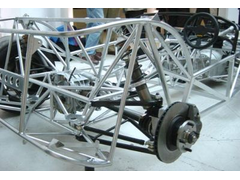

Rescued attachment 0093.jpeg

does anyone see a problem with you using FWD hubs on the rear (in a FWD to RWD conversion, and just fixing the hubs (to stop them steering) with a
link bar??.
Ray
[Edited on 21/3/07 by rayward]
I'm sure this has been use before on other kit cars.
Could you not arrange it so that when the car rolls on a corner the bump steer would also steer, like those cars with 4x4 steering?
Just make sure Ray you get the lump the right way round otherwise you'll end up with 5 back and only 1 forward gear!
Steve
Like this?


Rescued attachment 0093.jpeg
The rear engined kits out of Sylva use front dirive hubs on the back.
The steering arm gives you some opportunity for adjustment
quote:
Originally posted by coozer
The rear engined kits out of Sylva use front dirive hubs on the back.
The steering arm gives you some opportunity for adjustment

how did you get a picture of my car? 
The MG F/TF used Metro front hubs all round.
If it helps to ease your mind, the Pontiac Fiero was built exactly this way (FWD package, complete, transposed to the rear), and it works very
well!!

Sylva mojo link
http://www.sylva.co.uk/mojobrochure.htm
The info here is good, also the linked pics
A cable operated handbrake might be your only problem although easily fixed. Ditto to the adjustable comments.
Wyn
I`ve used hubs at rear, vauxhall vectra (quite good design).
Re tie rods:
Short will result in the wheels toeing in in up/down movement.
Very long will toe out, but to a much lesser extent.
For little to none toe the joints need to be inline with the suspenstion mouting points, and need to ideally be parrallel to the lower arm.
On mine I have very little toe, hardly noticable over +- 3 inches travel.
Darren
As the previous post, you remove bump steer from the back the same way as you would from the front. Think of the locking arms as the arms from a steering locked in the straight ahead position.